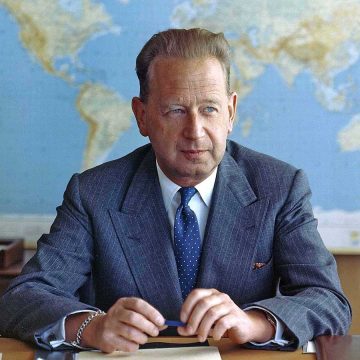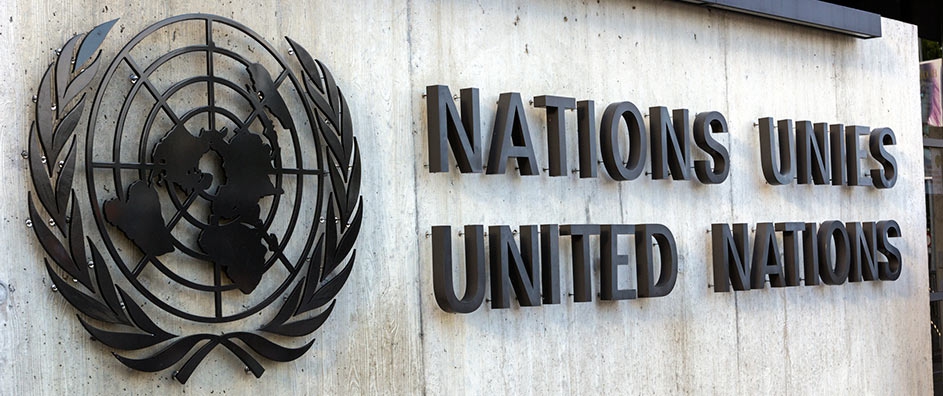The views expressed in our content reflect individual perspectives and do not represent the authoritative views of the Baha'i Faith.
If you look around on the web, you’ll find a whole lot of negativity about the United Nations.
The UN has weathered a raft of criticism during its seventy-two years of existence—that it is overly bureaucratic, that it is ineffective in some areas of world conflict and peacekeeping, and that the undemocratic veto power of the Security Council nations causes unnecessary stasis and policy gridlock. Developing nations have charged that the elite developed nations control the UN, to the detriment of the global South and the world’s poorest peoples.
Some critics have pointed out that less than half of the UN’s member nations are free democracies—and have charged that the UN therefore caters more to the needs of oligarchies and dictatorships. Others believe that the UN is a communist plot, intended to enslave the world’s peoples by establishing an authoritarian global rule.
But regardless of the criticism, and despite its drawbacks and structural limitations, most would agree that the United Nations has accomplished something the world has never previously witnessed: a working intergovernmental body that can sometimes transcend the outmoded, war-inducing model of national sovereignty so detrimental to humanity, and prevent or mitigate catastrophic global conflicts. For almost three-quarters of a century, and during a period when the world’s nations have armed themselves with a bristling storehouse of the most fearsome weapons ever conceived, we have successfully averted another world war.
Even with that tremendous accomplishment to its credit, just about everyone realizes that the United Nations needs remodeling.
By design, the UN Charter allows for changes to its structure. The framers of the UN anticipated that its structure would need revision as the world changed, so they included a provision (Article 108) for amending its Charter. In fact, the first Charter Revision Conference took place in 1955, a decade after the UN’s formation in 1945. The global Baha’i community took part in that process, when the world’s Baha’i National Spiritual Assemblies—the elected administrative bodies of the Baha’is in every nation—made collective formal suggestions to the UN for reform.

Dag Hammarskjold former secretary general of the United Nations.
Called “Proposals for Charter Revision Submitted to the United Nations by the Baha’i International Community,” the document was sent to every Charter Revision Conference delegate—and represented the first time the Baha’is of the world had come together to make recommendations to a global governance body.
Before the UN’s Charter Revision Conference took place, seven of the world’s major religions held a “Festival of Faith” in San Francisco. Fifteen thousand people came to recognize and celebrate the seven Faiths represented there: Baha’i, Buddhist, Christian-Eastern Orthodox, Christian-Protestant, Hindu, Jewish, Muslim and Orthodox.
The Charter Revision letter the world’s Baha’is sent to Dag Hammarskjold, then the Secretary-General of the United Nations, reveals a great deal about how Baha’is view the evolution of a world government:
Dear Mr. Secretary-General:
The Baha’i International Community, in its capacity of an international nongovernmental organization, submits recommendations for revision of the Charter of United Nations and the Statute of the International Court of Justice.
These recommendations constitute the considered views of the twelve National Baha’i Assemblies representing the Baha’is of Iran, India, Pakistan and Burma, Australia and New Zealand, Iraq, Egypt and Sudan, Germany and Austria, Italy and Switzerland, the British Isles, Canada, Central America, South America and the United States. Their participation unites a wide diversity of national, racial and religious backgrounds in one common concept of the structure needed to establish justice and peace.
In submitting its recommendations the Baha’i International Community is concerned with the desperate condition into which the nations and peoples of the world have fallen. The seeds of destruction are sown within as well as without the present membership of United Nations. No minor and legalistic adjustment of the Charter, the Baha’is are convinced, can restore the supremacy of moral law in the conduct of human affairs nor seize control of events from the chaos which engulfs mankind. The Baha’is appeal to every enlightened and responsible statesman associated with United Nations to grasp, before it is too late, this providential opportunity to create a political organism commensurate with the new and unprecedented character of the world in our time.
The Baha’i recommendations are based upon three apparent truths: that real sovereignty is no longer vested in the institutions of the national state because the nations have become interdependent; that the existing crisis is moral and spiritual as well as political; and that the existing crisis can only be surmounted by the achievement of a world order representative of the peoples as well as the nations of mankind.
The Baha’i concept of world order is defined in these terms: A world Super-State in whose favor all the nations of the world will have ceded every claim to make war, certain rights to impose taxation and all rights to maintain armaments, except for purposes of maintaining internal order within their respective dominions. This State will have to include an International Executive adequate to enforce supreme and unchallengeable authority on every recalcitrant member of the Commonwealth; a World Parliament whose members are elected by the peoples in their respective countries and whose election is confirmed by their respective governments: a Supreme Tribunal whose judgment has a binding effect even in cases where the parties concerned have not voluntarily agreed to submit their case to its consideration.
Since action by peoples as well as governments is essential, the Baha’i recommendations include the proposal that consideration of revision by United Nations be accompanied by wide dissemination of the principles of international relations and the calling of peoples’ conventions to register the general will.
Impossible as the achievement of world order may appear to traditionalist or partisan, mankind is passing through a crucial stage likened to that of an individual entering maturity and using new powers and faculties beyond the grasp of irresponsible youth. Unassailable is the position that any lesser international body represents a compromise with the forces of disaster and destruction.
In support of its thesis the Baha’i International Community presents with this letter an annex citing references to the subject in Baha’i writings, and an annex proposing specific revisions.
Sincerely,
Baha’i International Community
This cover letter (we’ll get to the actual recommendations in subsequent essays in this series) was written in May of 1955, when the USSR and the USA were locked in a de-stabilizing, nuclear-armed Cold War that threatened the stability and survival of humanity.
The letter to the UN from the world’s Baha’is cited three “apparent truths”—1.) that national sovereignty has been replaced by interdependence; 2.) that political crises are really moral and spiritual in nature; and 3.) that the only way to stabilize the world is the formation of a true world order that represents the people and the nations of the entire planet.
All of these recommendations follow directly from Baha’u’llah’s original call to humanity:
Blessed and happy is he that ariseth to promote the best interests of the peoples and kindreds of the earth. … It is not for him to pride himself who loveth his own country, but rather for him who loveth the whole world. The earth is but one country, and mankind its citizens. – Gleanings from the Writings of Baha’u’llah, p. 250.
You May Also Like
Comments

















Thank you for publishing this.